人教版(2019)选择性必修二 Unit 5 First Aid Discovering useful structures(课件27张PPT)
文档属性
| 名称 | 人教版(2019)选择性必修二 Unit 5 First Aid Discovering useful structures(课件27张PPT) |
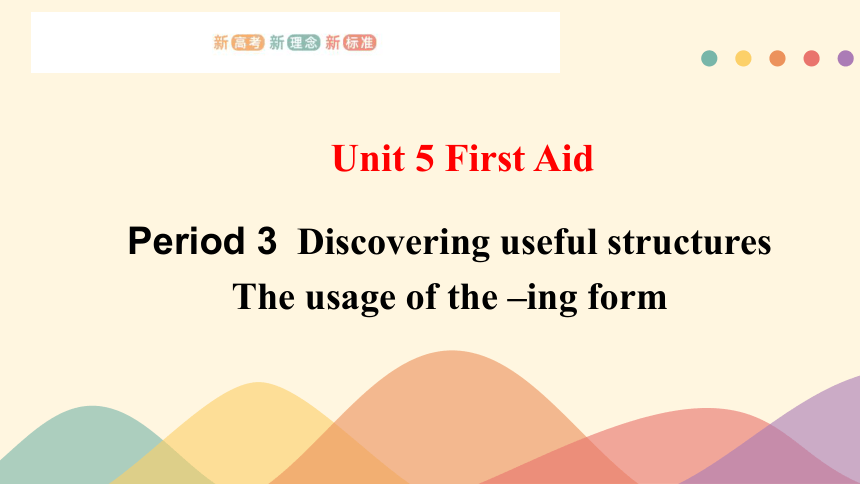
|
|
| 格式 | pptx | ||
| 文件大小 | 1.7MB | ||
| 资源类型 | 教案 | ||
| 版本资源 | 人教版(2019) | ||
| 科目 | 英语 | ||
| 更新时间 | 2023-04-11 00:00:00 | ||
图片预览

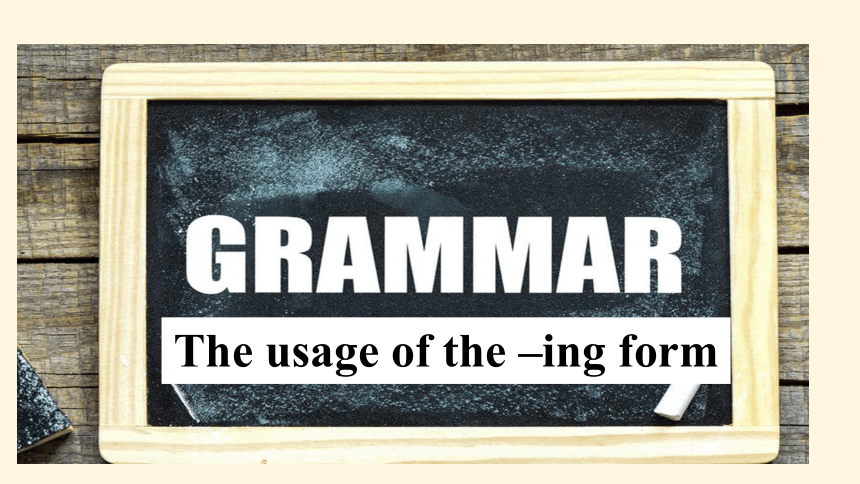
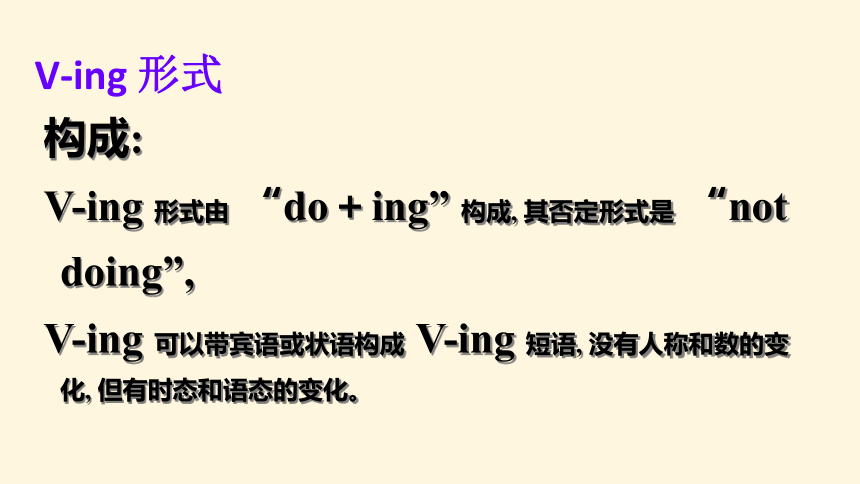
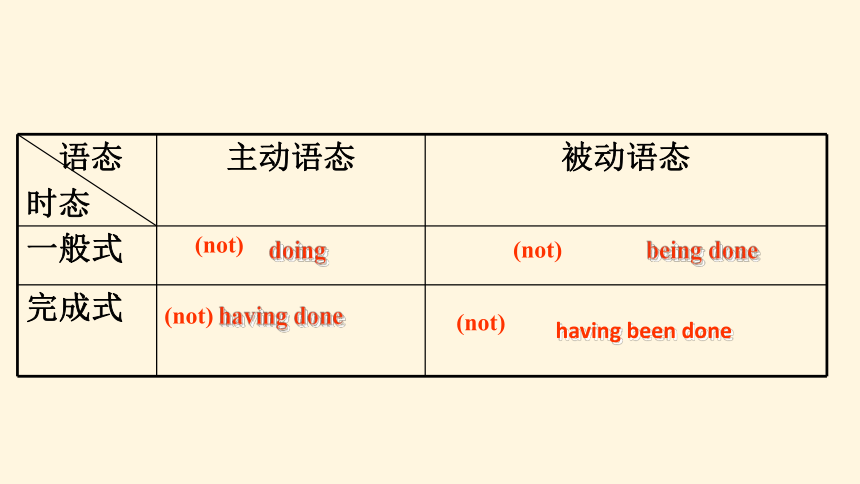

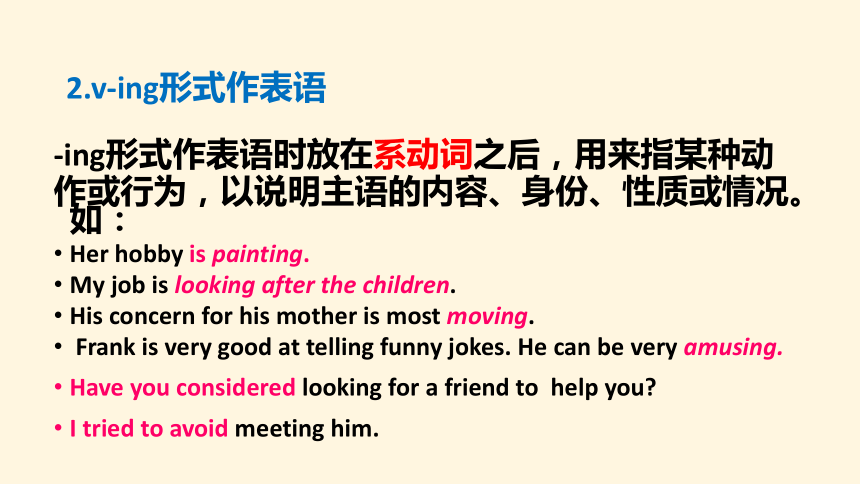
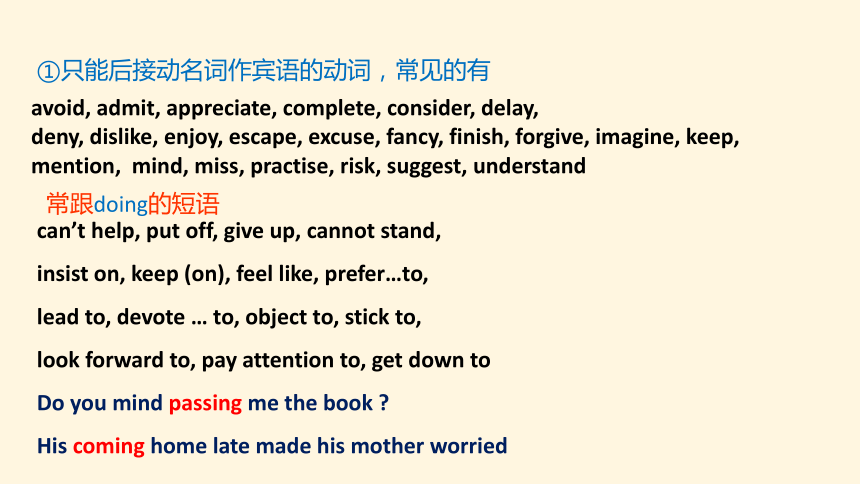
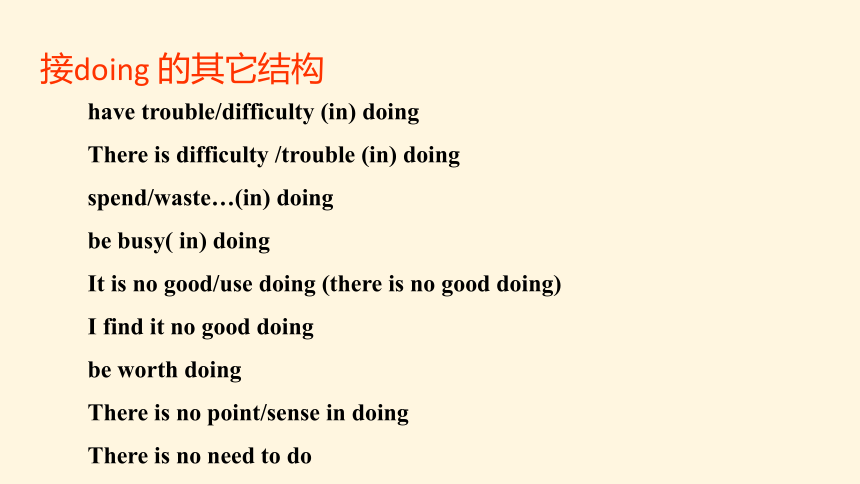
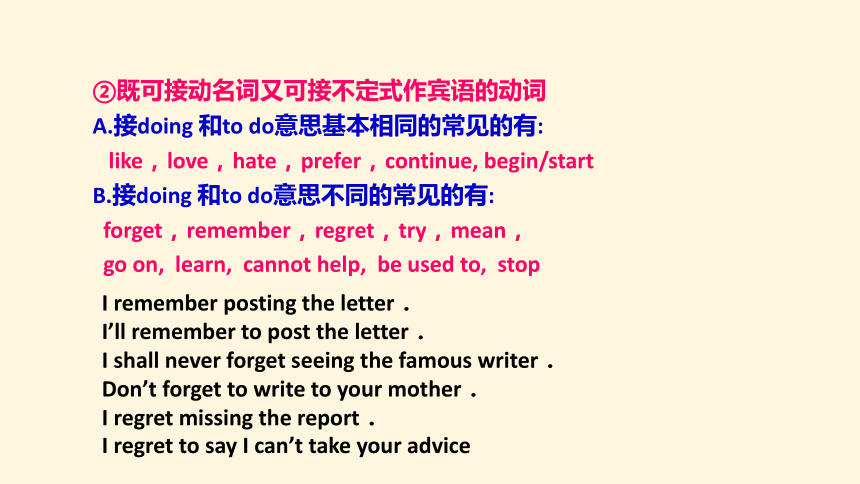
文档简介
(共27张PPT)
Period 3 Discovering useful structures
The usage of the –ing form
Unit 5 First Aid
The usage of the –ing form
构成:
V-ing 形式由 “do+ing” 构成, 其否定形式是 “not doing”,
V-ing 可以带宾语或状语构成 V-ing 短语, 没有人称和数的变化, 但有时态和语态的变化。
V-ing 形式
语态 时态 主动语态 被动语态
一般式
完成式
doing
being done
having done
having been done
(not)
(not)
(not)
(not)
Playing tricks on others is something we should never do.
Learning new words is very important for me.
①直接置于句首
②用形式主语it,把真正的主语ing形式移置句尾。但这种句子形式有一定的限制,作表语的只能是某些形容词或少数名词。
It’s worth making the effort.
It's no use crying over spilt milk.
It’s useless arguing with him.
作用
1.作主语
-ing形式作表语时放在系动词之后,用来指某种动
作或行为,以说明主语的内容、身份、性质或情况。如:
Her hobby is painting.
My job is looking after the children.
His concern for his mother is most moving.
Frank is very good at telling funny jokes. He can be very amusing.
Have you considered looking for a friend to help you
I tried to avoid meeting him.
2.v-ing形式作表语
①只能后接动名词作宾语的动词,常见的有
avoid, admit, appreciate, complete, consider, delay,
deny, dislike, enjoy, escape, excuse, fancy, finish, forgive, imagine, keep, mention, mind, miss, practise, risk, suggest, understand
can’t help, put off, give up, cannot stand,
insist on, keep (on), feel like, prefer…to,
lead to, devote … to, object to, stick to,
look forward to, pay attention to, get down to
Do you mind passing me the book
His coming home late made his mother worried
常跟doing的短语
接doing 的其它结构
have trouble/difficulty (in) doing
There is difficulty /trouble (in) doing
spend/waste…(in) doing
be busy( in) doing
It is no good/use doing (there is no good doing)
I find it no good doing
be worth doing
There is no point/sense in doing
There is no need to do
②既可接动名词又可接不定式作宾语的动词
A.接doing 和to do意思基本相同的常见的有:
like,love,hate,prefer,continue, begin/start
B.接doing 和to do意思不同的常见的有:
forget,remember,regret,try,mean,
go on, learn, cannot help, be used to, stop
I remember posting the letter.
I’ll remember to post the letter.
I shall never forget seeing the famous writer.
Don’t forget to write to your mother.
I regret missing the report.
I regret to say I can’t take your advice
D. 在allow, advise, forbid, permit (consider)后直接跟动名词作宾语,如果有名词或代词作宾语,则构成“allow/advise/forbid/permit +名词/代词+不定式(宾语补足语)”之形式。如:
We don't allow smoking here.
We don't allow anybody to smoke here.
We consider coming back tomorrow.
We consider him to have come back.
①只能后接动名词作宾语的动词,常见的有
avoid, admit, appreciate, complete, consider, delay,
deny, dislike, enjoy, escape, excuse, fancy, finish, forgive, imagine, keep, mention, mind, miss, practice, risk, suggest, understand
can’t help, put off, give up, cannot stand,
insist on, keep (on), feel like, prefer…to,
lead to, devote … to, object to, stick to,
look forward to, pay attention to, get down to
常跟doing的短语
接doing 的其它结构
have trouble/difficulty (in) doing
There is difficulty /trouble (in) doing
spend/waste…(in) doing
be busy( in) doing
It is no good/use doing (there is no good doing)
I find it no good doing
be worth doing
There is no point/sense in doing
There is no need to do
-ing形式作表语时放在系动词之后,用来指某种动
作或行为,以说明主语的内容、身份、性质或情况。如:
Her hobby is painting.
My job is looking after the children.
His concern for his mother is most moving.
Frank is very good at telling funny jokes. He can be very amusing.
4.v-ing形式作表语
1. 单个动词的-ing形式作定语位于被修饰名词的前面,既可以表示被修饰者的作用或功能,也可以表示被修饰者的动作或状态。如:
building materials = materials for building
drinking water = water for drinking
a surprising result = a result that is surprising
a sleeping boy=a boy who is sleeping
5.v-ing形式作定语
They lived in a room facing the street.
= They lived in a room that faces the street.
The man standing there is Peter’s father.
= The man who is standing there is Peter’s father.
2. -ing形式短语作定语时, 放在所修饰的名词之后, 并且在意思上相当于一个定语从句。如:
Anybody swimming in this river will be fined.
= Anybody who is swimming in this river will be fined.
3. -ing形式短语也可以用作非限制定语,相当于一个非限制性定语从句,这时,它与句子其他部分用逗号分开。如:
His brother, working as a teacher, lives in Beijing.
= His brother, who is working as a teacher, lives in Beijing.
他那个当教师的哥哥住在北京。
1. 1) 动词-ing形式作宾语补足语常放在宾语后面,表示一个正在进行的主动性的动作,强调一个进行的动作或一种状态。如:
When we returned to the school, we found a stranger standing at the entrance.
6.v-ing形式作宾语补足语
We found the snake eating the eggs.
I found a bag lying on the ground.
The boss kept the workers working the whole night.
2)当主句转换为被动结构时, 原来作宾语补足语的动词-ing形式便转换为主语补足语。如:
They found the result very satisfying.
= The result is found very satisfying.
这个结果很令人满意。
They heard him singing in the next room.
= He was heard singing in the next room.
有人听到他在隔壁房间唱歌。
We mustn’t keep them waiting.
= They mustn’t be kept waiting.
千万不能让他们等。
2. 能用-ing形式作宾语补足语的动词:
1) 表示感觉和心理状态的动词,常见的有see, hear, feel, smell, find, notice, observe, look at, listen to等。
We saw a light burning in the window.
I felt somebody patting me on the shoulder.
Can you smell anything burning
Listen to the birds singing.
I didn’t notice him waiting.
I won’t have you doing that.
This set me thinking.
I’m sorry to have kept you waiting.
I can’t get the clock going again.
You won’t catch me doing that again.
你看吧,我决不会做那种事了。
2) 表示指使意义的动词,常见的有have, set, send, keep, get, catch, leave等。如:
可以表示时间, 原因, 结果, 条件, 让步,行为方式或伴随动作等。
1.Using your head, you’ll find a good way.
2. Four people entered the room looking around in a curious way.
= Four people entered the room and looked around in a curious way.
3.Being poor, he couldn’t afford a TV set.
4.Working hard, you’ll surely succeed.
5.The boy sat in front of the farmhouse, cutting the branch.
6. He came running back to tell me the news.
7. Admitting what you say, I still think you are wrong.
条件
7.作状语
伴随(动作)
原因
条件
伴随
方式
让步
8) (When) Hearing the news, he got frightened.
= When he heard the news, he got frightened. when
9) The child slipped and fell, hitting his head against the door.
结果
时间, 可以在分词前保留
7.作状语
-ing形式作状语时, 它的逻辑主语必须与主句的主语是一致的。
Time permitting, I will pay a visit to the whole city.
(分词的逻辑主语是time , 而句子的主语是I , 两者不构成主谓关系, 所以只能用独立主格结构, 也就是给现在分词补充一个主语。)
考点提示:
用所给动词的适当形式填空。
1. Not ________(know) his address, I couldn’t go to see him yesterday.
2. Look out for cars when _______(cross) the street.
3. Not _________________ (invite) to the party, Mary was greatly hurt.
knowing
crossing
having been invited
巩固练习
4. He swam in the water, ______ (leave) only his face exposed.
5. When I got back home I saw a message pinned to the door, _______ (read)
“Sorry to miss you; I will call later.”
6. _______ (take) a deep breath, they dived into the water.
7. ____________ (close) the windows and the door, the students left the room.
leaving
reading
Taking
Having closed
感谢您的观看
Period 3 Discovering useful structures
The usage of the –ing form
Unit 5 First Aid
The usage of the –ing form
构成:
V-ing 形式由 “do+ing” 构成, 其否定形式是 “not doing”,
V-ing 可以带宾语或状语构成 V-ing 短语, 没有人称和数的变化, 但有时态和语态的变化。
V-ing 形式
语态 时态 主动语态 被动语态
一般式
完成式
doing
being done
having done
having been done
(not)
(not)
(not)
(not)
Playing tricks on others is something we should never do.
Learning new words is very important for me.
①直接置于句首
②用形式主语it,把真正的主语ing形式移置句尾。但这种句子形式有一定的限制,作表语的只能是某些形容词或少数名词。
It’s worth making the effort.
It's no use crying over spilt milk.
It’s useless arguing with him.
作用
1.作主语
-ing形式作表语时放在系动词之后,用来指某种动
作或行为,以说明主语的内容、身份、性质或情况。如:
Her hobby is painting.
My job is looking after the children.
His concern for his mother is most moving.
Frank is very good at telling funny jokes. He can be very amusing.
Have you considered looking for a friend to help you
I tried to avoid meeting him.
2.v-ing形式作表语
①只能后接动名词作宾语的动词,常见的有
avoid, admit, appreciate, complete, consider, delay,
deny, dislike, enjoy, escape, excuse, fancy, finish, forgive, imagine, keep, mention, mind, miss, practise, risk, suggest, understand
can’t help, put off, give up, cannot stand,
insist on, keep (on), feel like, prefer…to,
lead to, devote … to, object to, stick to,
look forward to, pay attention to, get down to
Do you mind passing me the book
His coming home late made his mother worried
常跟doing的短语
接doing 的其它结构
have trouble/difficulty (in) doing
There is difficulty /trouble (in) doing
spend/waste…(in) doing
be busy( in) doing
It is no good/use doing (there is no good doing)
I find it no good doing
be worth doing
There is no point/sense in doing
There is no need to do
②既可接动名词又可接不定式作宾语的动词
A.接doing 和to do意思基本相同的常见的有:
like,love,hate,prefer,continue, begin/start
B.接doing 和to do意思不同的常见的有:
forget,remember,regret,try,mean,
go on, learn, cannot help, be used to, stop
I remember posting the letter.
I’ll remember to post the letter.
I shall never forget seeing the famous writer.
Don’t forget to write to your mother.
I regret missing the report.
I regret to say I can’t take your advice
D. 在allow, advise, forbid, permit (consider)后直接跟动名词作宾语,如果有名词或代词作宾语,则构成“allow/advise/forbid/permit +名词/代词+不定式(宾语补足语)”之形式。如:
We don't allow smoking here.
We don't allow anybody to smoke here.
We consider coming back tomorrow.
We consider him to have come back.
①只能后接动名词作宾语的动词,常见的有
avoid, admit, appreciate, complete, consider, delay,
deny, dislike, enjoy, escape, excuse, fancy, finish, forgive, imagine, keep, mention, mind, miss, practice, risk, suggest, understand
can’t help, put off, give up, cannot stand,
insist on, keep (on), feel like, prefer…to,
lead to, devote … to, object to, stick to,
look forward to, pay attention to, get down to
常跟doing的短语
接doing 的其它结构
have trouble/difficulty (in) doing
There is difficulty /trouble (in) doing
spend/waste…(in) doing
be busy( in) doing
It is no good/use doing (there is no good doing)
I find it no good doing
be worth doing
There is no point/sense in doing
There is no need to do
-ing形式作表语时放在系动词之后,用来指某种动
作或行为,以说明主语的内容、身份、性质或情况。如:
Her hobby is painting.
My job is looking after the children.
His concern for his mother is most moving.
Frank is very good at telling funny jokes. He can be very amusing.
4.v-ing形式作表语
1. 单个动词的-ing形式作定语位于被修饰名词的前面,既可以表示被修饰者的作用或功能,也可以表示被修饰者的动作或状态。如:
building materials = materials for building
drinking water = water for drinking
a surprising result = a result that is surprising
a sleeping boy=a boy who is sleeping
5.v-ing形式作定语
They lived in a room facing the street.
= They lived in a room that faces the street.
The man standing there is Peter’s father.
= The man who is standing there is Peter’s father.
2. -ing形式短语作定语时, 放在所修饰的名词之后, 并且在意思上相当于一个定语从句。如:
Anybody swimming in this river will be fined.
= Anybody who is swimming in this river will be fined.
3. -ing形式短语也可以用作非限制定语,相当于一个非限制性定语从句,这时,它与句子其他部分用逗号分开。如:
His brother, working as a teacher, lives in Beijing.
= His brother, who is working as a teacher, lives in Beijing.
他那个当教师的哥哥住在北京。
1. 1) 动词-ing形式作宾语补足语常放在宾语后面,表示一个正在进行的主动性的动作,强调一个进行的动作或一种状态。如:
When we returned to the school, we found a stranger standing at the entrance.
6.v-ing形式作宾语补足语
We found the snake eating the eggs.
I found a bag lying on the ground.
The boss kept the workers working the whole night.
2)当主句转换为被动结构时, 原来作宾语补足语的动词-ing形式便转换为主语补足语。如:
They found the result very satisfying.
= The result is found very satisfying.
这个结果很令人满意。
They heard him singing in the next room.
= He was heard singing in the next room.
有人听到他在隔壁房间唱歌。
We mustn’t keep them waiting.
= They mustn’t be kept waiting.
千万不能让他们等。
2. 能用-ing形式作宾语补足语的动词:
1) 表示感觉和心理状态的动词,常见的有see, hear, feel, smell, find, notice, observe, look at, listen to等。
We saw a light burning in the window.
I felt somebody patting me on the shoulder.
Can you smell anything burning
Listen to the birds singing.
I didn’t notice him waiting.
I won’t have you doing that.
This set me thinking.
I’m sorry to have kept you waiting.
I can’t get the clock going again.
You won’t catch me doing that again.
你看吧,我决不会做那种事了。
2) 表示指使意义的动词,常见的有have, set, send, keep, get, catch, leave等。如:
可以表示时间, 原因, 结果, 条件, 让步,行为方式或伴随动作等。
1.Using your head, you’ll find a good way.
2. Four people entered the room looking around in a curious way.
= Four people entered the room and looked around in a curious way.
3.Being poor, he couldn’t afford a TV set.
4.Working hard, you’ll surely succeed.
5.The boy sat in front of the farmhouse, cutting the branch.
6. He came running back to tell me the news.
7. Admitting what you say, I still think you are wrong.
条件
7.作状语
伴随(动作)
原因
条件
伴随
方式
让步
8) (When) Hearing the news, he got frightened.
= When he heard the news, he got frightened. when
9) The child slipped and fell, hitting his head against the door.
结果
时间, 可以在分词前保留
7.作状语
-ing形式作状语时, 它的逻辑主语必须与主句的主语是一致的。
Time permitting, I will pay a visit to the whole city.
(分词的逻辑主语是time , 而句子的主语是I , 两者不构成主谓关系, 所以只能用独立主格结构, 也就是给现在分词补充一个主语。)
考点提示:
用所给动词的适当形式填空。
1. Not ________(know) his address, I couldn’t go to see him yesterday.
2. Look out for cars when _______(cross) the street.
3. Not _________________ (invite) to the party, Mary was greatly hurt.
knowing
crossing
having been invited
巩固练习
4. He swam in the water, ______ (leave) only his face exposed.
5. When I got back home I saw a message pinned to the door, _______ (read)
“Sorry to miss you; I will call later.”
6. _______ (take) a deep breath, they dived into the water.
7. ____________ (close) the windows and the door, the students left the room.
leaving
reading
Taking
Having closed
感谢您的观看
